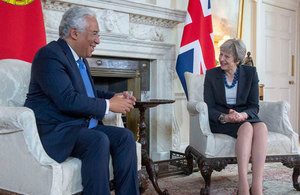Thank you very much Mr President.
This is a sad day for the Security Council. It’s a sad day for the cause of universal norms and standards and it’s a sad day for the non-proliferation regime. But above all it is a very sad day for the people of Douma who now are without the protection that the international system was set up to provide for them. It is the fourth time in six days that the Council has discussed chemical weapons. Yesterday, fourteen members of the Security Council called for an investigation. Several members called on the P5 to assume their responsibilities to uphold the universal prohibition on WMD. As a P5 member, the UK is ready to do that, was ready to do that and was joined by France and the US. Conversely by vetoing, Russia has crossed the line in the international order. And worse, if possible, history is repeating itself one year on from Khan Sheikhoun.
Mr President, Russia helped create the original investigation that attributed Khan Sheikhoun to the Syrian regime, and concluded that sarin, which can only be developed by a state actor, had been used. But last autumn Russia vetoed renewal of this mechanism on not one, but three occasions. The reason is clear. It is because Russia would rather cross the WMD line than risk sanction of its ally Syria. Instead we are asked to believe that the Russian version of this latest attack should be the one that the Security Council believes.
Mr President, Russia is not authorised by the Security Council to carry out an investigation in Syria. Russia says there were no traces of a chemical attack. No traces were found by whom? I repeat Mr President, Russia is not authorised to carry out an investigation on behalf of the Security Council. We need an independent investigative mechanism for that purpose and only that sort of mechanism can have the confidence of the Security Council and the confidence of the membership of the UN and the confidence of the people of Syria.
Sadly, Mr President, reports of chemical weapons attacks in Syria have continued since the original Russian veto in November. It’s become very clear that Russia will do what it takes to protect Syria, whatever the compelling evidence of the crimes committed and to shut down further investigation and discussion of those crimes. And this has come, Mr President, at the cost of Russia’s own obligations and credibility as a permanent member of this Council, as a State Party to the CWC and as a declared, and supposed, supporter of peace in Syria.
The Security Council has been unable to act solely because Russia has abused the power of veto to protect Syria from international scrutiny for the use of chemical weapons against the Syrian people. Even today, Mr President, there are open source investigations which have located a chlorine cylinder, the same kind that the JIM has found that the Syrian regime use, atop a house in Douma full of dead bodies who clearly died from respiratory problems. I frankly doubt, Mr President, that in 48 hours, Russia has verified all similar reports and can conclude that they are all fake. They are not fake, Mr President. They need to be looked at and investigated by a proper independent mechanism such as this Council was prepared today to pass.
Mr President, Russia’s credibility as a member of the Council is now in question. We will not stand idly by and watch Russia continue to undermine the global norms which have ensured all our security, including Russia’s, for decades. As a P5 member, the United Kingdom will stand up for international peace and security. It is our moral duty, Mr President. It is a matter of shame that Russia once again blocked a resolution. The Russian Ambassador mentioned that it was not a question of counting the number of Russian vetoes. I beg to differ, Mr President. To quote Lenin, “quantity has a quality all of its own”. Russia’s actions today are a step against the rules and authority of the Security Council and the wider United Nations. They are a step against international peace and security and non-proliferation. And they are a step against humanity.
